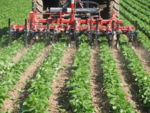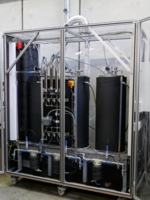-
Alpha-Protein GmbH - 27/07/2021
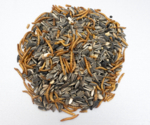
Mealworms instead of fish meal and soybean meal - this is what the sustainable future of feed production looks like as Alpha-Protein GmbH see it. The company has built a highly efficient automated production plant in which residual materials from local food production are used to breed mealworms.
https://www.biooekonomie-bw.de/en/articles/news/insect-farming-sustainability
-
-
Press release - 09/07/2021
Refuels are renewable fuels that can be produced in different ways. When they are mixed and processed such that they meet the existing fuel standards, they are suited for all types of combustion engines. This is the result of the latest vehicle and fleet tests within the project “reFuels – Rethinking Fuels” at Karlsruhe Institute of Technology (KIT). Compared to fully fossil fuels, refuel mixes allow for a CO2 reduction by 25% at least. Moreover,…
https://www.biooekonomie-bw.de/en/articles/pm/refuels-are-suited-wide-use
-
Press release - 07/07/2021
The European Union is largely dependent on imports of white phosphorus (P4), a strategic raw material for the food and pharmaceutical industries. To tackle this challenge, the newly started four-year EU-funded project FlashPhos – led by the University of Stuttgart – will recover at a large scale high-quality white phosphorus and other raw materials using sewage sludge as input material.
https://www.biooekonomie-bw.de/en/articles/pm/schatzsuche-im-klaerschlamm
-
Start-up kernique catch the zeitgeist - 29/06/2021
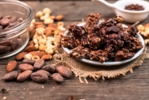
A delicious vegan nut snack that uses no sugar, artificial additives, gluten or palm oil, is full of essential nutrients, and is part of a commitment to environmental and social sustainability. Impossible? An Esslingen-based start-up called kernique proves otherwise. The start-up is currently planning a crowdfunding phase that offers a lucrative deal for investors. The idea catches the zeitgeist, but what exactly makes it stand out?
https://www.biooekonomie-bw.de/en/articles/news/nut-snack-sustainable-ecological-concept
-
-
Press release - 27/05/2021
The pulp of coffee beans is considered a waste product on coffee plantations, which is usually thrown away or dumped into rivers - with significant negative consequences for climate change and the environment. Macarena San Martín-Ruiz from the University of Stuttgart is working with Coopetarrazú, the largest coffee cooperative in Costa Rica, to find out how the mixture of pulp and husks can be turned into organic compost and thus protect the…
https://www.biooekonomie-bw.de/en/articles/pm/coffee-s-pulp-waste-becomes-organic-compost
-
Press release - 18/05/2021
The Bio-based Industries Joint Undertaking (BBI JU) has signed the grant agreements with 18 new projects, selected for funding under the 2020 Call for proposals. 199 beneficiaries from 26 countries across the EU and beyond will receive BBI JU’s financial support worth €104.5 million. This is the seventh and last BBI JU call which will bring the total investment of the initiative to €821.6 million and the BBI JU’s portfolio to 142 projects.
https://www.biooekonomie-bw.de/en/articles/pm/bbi-ju-invest-eur1045-million-circular-bio-based-projects
-
Press release - 03/05/2021
The amount of plastic waste increases every year. Some of this waste is due to plastic packaging used to protect food. As part of the “BioActiveMaterials” project, researchers at the Fraunhofer-Gesellschaft have developed an eco-friendly coating for paper packaging. With this, not only is plastic saved, but the coating of plant-based proteins and waxes also extends the shelf life of the food.
https://www.biooekonomie-bw.de/en/articles/pm/bioactive-paper-coatings-replace-plastic-packaging-foods
-
-
-
-
Press release - 20/04/2021
Protecting the global climate is an undertaking that presents both industry and society with a major task. It will not be possible to achieve the climate targets simply by limiting global emissions, by saving carbon dioxide (CO2). This is because there will continue to be unavoidable CO2 emissions that will nevertheless have to be compensated.
https://www.biooekonomie-bw.de/en/articles/pm/cellulosefasern-gegen-den-klimawandel
-
-
-
-
-
Press release - 26/01/2021
The University of Warmia and Mazury in Olsztyn, Polish partner of the BalticBiomass4Value project, published a report which maps biomass value chains for improved sustainable energy use in the Baltic Sea Region countries. The research focuses on the 9 Baltic Sea Region (BSR) countries: Denmark, Germany, Estonia, Finland, Latvia, Lithuania, Poland, Sweden, and Norway.
https://www.biooekonomie-bw.de/en/articles/pm/report-mapping-biomass-value-chains-improved-sustainable-energy-use-baltic-sea-region-countries-published
-
Paper production from plant fibres - 20/01/2021

Many consumers don't care about exactly how their paper packaging is made and what it is made of as long as it is "eco". But even producing recycled paper, trees need to be felled. An alternative could be paper made from cup plant. Together with partners, a company called Silphie Paper has developed concept for obtaining fibres for a new type of grass paper, while also producing heat, energy and nutrients for natural fertilisers.
https://www.biooekonomie-bw.de/en/articles/news/one-cycle-ecopaper-energy-and-fertiliser-made-silphium-perfoliatum
-
Press release - 04/01/2021
As healthy and tasty as mushrooms might be, they are good for much more than just the dinner plate. The Fraunhofer Institute for Environmental, Safety and Energy Technology UMSICHT has now teamed up with the Fraunhofer Institute for Building Physics IBP to investigate the use of fungus-based materials for the fabrication of eco-friendly sound absorbers.
https://www.biooekonomie-bw.de/en/articles/pm/Fungus-as-a-sound-absorber
-
-
Phosphorus recovery from sewage sludge - 21/10/2020
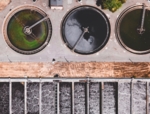
Biotechnology for the bioeconomy: in something known as the P-bac process, sulphur bacteria extract phosphorus from sewage sludge ash. Phosphorus is one of the key building blocks of life and an essential nutrient for plant growth. When there is not enough phosphorus in the soil, farmers apply it via organic or mineral fertilisers.
https://www.biooekonomie-bw.de/en/articles/news/bacteria-help-recycle-phosphorus
-
Qualitative soil fertiliser - 10/07/2020
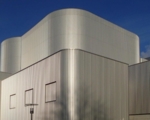
Recycled material instead of waste: wood ash is good for soil and plants - if the quality is right. The German Federal Quality Association for Food Ash ensures reliable wood ash standards with its certifications. The RAL-Dünger label for fertilisers provides the necessary certification for natural wood ashes to be used in the circular economy.
https://www.biooekonomie-bw.de/en/articles/news/how-natural-cycles-can-be-closed-wood-ash
-
-
The “Rhizo-Lentil" EIP-AGRI project - 20/05/2020
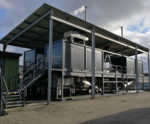
NovoCarbo GmbH produces biochar from plant residues such as wood chips, nutshells and manure. Different feedstocks, and the way these materials are processed, create biochars with different properties. This makes biochar suitable for different uses, including as a soil conditioner, in biogas plants or as bedding for stables and cowsheds. The Rhizo-Linse project is currently investigating whether biochar is also suitable as inoculant carrier for…
https://www.biooekonomie-bw.de/en/articles/news/novocarbo-turns-plant-waste-into-biochar
Website address: https://www.biooekonomie-bw.de/en/search




